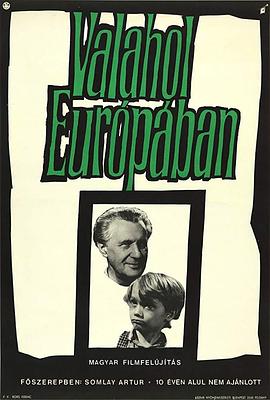简介
Somewhere in the remote region, the war ends. In the midst of ruined cities and houses in the streets, in rural hamlets, everywhere where people still live, are children who have lost their homes and parents. Abandoned, hungry, and in rags, defenseless and humiliated, they wander through the world. Hunger drives them. Little streams of orphans merge into a river which rushes forward and submerges everything in its path. The children do not know any feeling; they know only the world of their enemies. They fight, steal, struggle for a mouthful of food, and violence is merely a means to get it. A gang led by Cahoun finds a refuge in an abandoned castle and encounters an old composer who has voluntarily retired into solitude from a world of hatred, treason, and crime. How can they find a common ground, how can they become mutual friends The castle becomes their hiding place but possibly it will also be their first home which they may organize and must defend. But even for this, the price will be very high. To this simple story, the journalist, writer, poet, scriptwriter, movie director, and film theoretician Béla Balázs applied many years of experience. He and the director Géza Radványi created a work which opened a new postwar chapter in Hungarian film. Surprisingly, this film has not lost any of its impact over the years, especially on a profound philosophical level. That is to say, it is not merely a movie about war; it is not important in what location and in what period of time it takes place. It is a story outside of time about the joyless fate of children who pay dearly for the cruel war games of adults. At the time it was premiered, the movie was enthusiastically received by the critics. The main roles were taken by streetwise boys of a children's group who created their roles improvisationally in close contact with a few professional actors, and in the children's acting their own fresh experience of war's turmoil appears to be reflected. At the same time, their performance fits admirably into the mosaic of a very complex movie language. Balázs's influence revealed itself, above all, in the introductory sequences an air raid on an amusement park, seen in a montage of dramatic situations evoking the last spasms of war, where, undoubtedly, we discern the influence of classical Soviet cinematography. Shooting, the boy's escape, the locomotive's wheels, the shadows of soldiers with submachine guns, the sound of a whistle—the images are linked together in abrupt sequences in which varying shots and expressive sharp sounds are emphasized. A perfectly planned screenplay avoided all elements of sentimentality, time-worn stereotypes of wronged children, romanticism and cheap simplification. The authors succeeded in bridging the perilous dramatic abyss of the metamorphosis of a children's community. Their telling of the story (the scene of pillaging, the assault on the castle, etc) independently introduced some neorealist elements which, at that time, were being propagated in Italy by De Sica, Rossellini, and other film artists. The rebukes of contemporary critics, who called attention to formalism for its own sake have been forgotten. The masterly art of cameraman Barnabás Hegyi gives vitality to the poetic images. His angle shots of the children, his composition of scenes in the castle interior, are a living document of the times, and underline the atmosphere and the characters of the protagonists. The success of the picture was also enhanced by the musical art of composer Dénes Buday who, in tense situations, inserted the theme of the Marseilaise into the movie's structure, as a motive of community unification, as an expression of friendship and the possibility of understanding. Valahol Europaban is the first significant postwar Hungarian film. It originated in a relaxed atmosphere, replete with joy and euphoria, and it includes these elements in order to demonstrate the strength of humanism, tolerance, and friendship. It represents a general condemnation of war anywhere in the world, in any form.
猜你喜欢
-
HD
阿郎的故事国语
主演:周润发,张艾嘉,黄坤玄,吴孟达,王天林 -
HD
等候董建华发落国语
主演:邓树荣,艾敬,李炜尚,邱礼涛 -
HD
一秒拳王国语
主演:周国贤,林明祯,赵善恒,张建声,熊倬乐,查侬·散顶腾古,卢海鹏,袁富华,黄又南,蔡瀚亿,黄溢濠,周祉君,岑珈其,张松枝 -
HD
第一茧国语
主演:刘德华,吴家丽,马斯晨,林建明,倪雪,曾江 -
HD
低一点的天空国语
主演:钟欣潼,郑则仕,黎耀祥,骆应钧,张同祖,韩马利,蔡安荞,杨茜尧,彭慧君,江美仪 -
HD
下一站…天后国语
主演:蔡卓妍,陈小春,余文乐,周励淇,韩君婷,林雪,杜汶泽,Chapman,To -
HD
酱园弄·悬案
主演:章子怡,王传君,易烊千玺,梅婷,赵丽颖,雷佳音,刘润萱,章宇,安娜·柯克,杨幂,康春雷,张羽霖,彭昱畅,尹昉,沈佳妮,陈国庆,张建亚,周野芒,大鹏,李现,徐祥,孙强,范伟 -
HD
神圣之路
主演:裴淳华,马修·瑞斯,保罗·泰来克,梅根·麦克唐奈,斯蒂文·琼斯 -
HD
地球特派员
主演:约纳斯·基布雷亚布,佐伊·索尔达娜,雷米·埃德格利,布兰登·穆恩,布拉德·加内特,贾米拉·贾米尔,杨·迪伦,杰克·戈特曼,马提亚斯·施维赫夫,安娜·狄拉·雷格拉,冈冢敦子,雪莉·亨德森,渡边直美,布兰登·亨特,阿妮莎·博雷格,谢尔碧·杨,鲍勃·彼德森,凯特·穆格鲁,塔马拉·图尼 -
HD
少林三十六房国语
主演:刘家辉,罗烈,刘家荣,徐少强,张午郎,唐伟成,吴杭生,汪禹,矮冬瓜,陈会毅,陈龙,詹森,陈思佳 -
HD
龙虎风云国语
主演:周润发,李修贤,孙越,吴家丽,张耀扬,徐锦江 -
HD
花城国语
主演:周润发,郑裕玲,夏文汐,张国柱,马斯晨,张健华

